Anthony Foley: Glasgow Warriors swept away in sea of Munster emotion
- Published
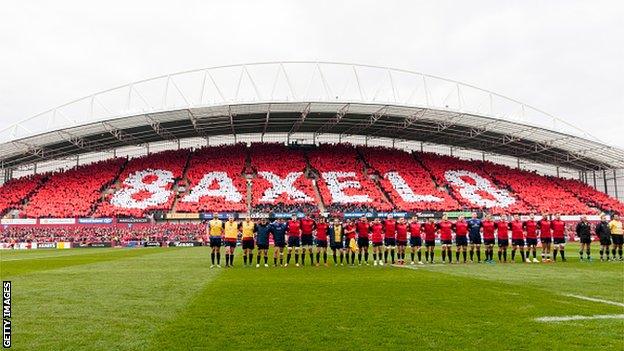
Munster fans pay tribute to their former captain and head coach Anthony Foley
It might seem peculiar to begin this most Munster of stories with a comment from a Leinsterman, but in a week that made no sense, maybe it's apt, in a strange kind of way.
The loss of Anthony Foley transcended provincial borders and national borders. It even transcended sport. People with no connection to Killaloe, where he was laid to rest on Friday, or Limerick, where his memory was evoked so thunderously on Saturday, were moved by the tragedy of his wife and two young boys left behind to deal with the cataclysm of his death.
So we begin not with the epic at Thomond Park but with a slow walk down the back streets of Foley's home town, the funeral cortege following his coffin from the gates of St Flannan's church to the graveyard, down the road, around the corner, past the GAA club and in the narrow gap to his final resting place.
Munster players of Foley's vintage carried the coffin, then they paused, handed it over to six more and the next wave of team-mates took it onwards. Every 100 yards or so, new pallbearers - men who had played, laughed and cried with him - carried him forward. For so long he was their protector, now the roles had been heartbreakingly reversed.
Walking a discreet distance behind was our Leinsterman - Malcolm O'Kelly. At 6ft 8in tall, hard to miss.
O'Kelly, a lock forward of the highest quality, won 92 caps for Ireland, 47 of them in the same pack as Foley. He looked at the scene ahead of him, this changing guard of Munster greats, and said quietly: "No shortage of big shoulders today."
Emotional build-up
At the time, approaching 2pm on Friday, it was almost inconceivable that the current crop of Munster players could leave the funeral of their coach and the emotion of his graveside and immediately focus on a game less than 24 hours away. It was borderline cruel to even ask them and nigh on impossible to envisage them holding it together so soon after a piece of their world had fallen apart.
At 10.30am on Saturday, Thomond Park was busy. Two and a half hours to kick-off and yet the place was filling up. What struck you was the warmth of the welcome and the brilliance of the organisation.
Pre-match was powerful. The songs, the montage on the big screen and then more songs. The guard of honour from kids from Foley's old school, St Munchin's, and Foley's old club, Shannon.
When the minute's silence ended, what passed as normality hit Thomond Park again, but you wanted to wince in that moment. You felt for the Munster players and the burden they were carrying. You knew how good Glasgow could be and the damage they could wreak.
Forty-plus points on Leicester Tigers last weekend at Scotstoun. The lethal running of Stuart Hogg, the orchestration of Finn Russell and Henry Pyrgos, the power and mobility of their pack led by the wonderful tyro, Jonny Gray.
If they put 40 on Leicester, what could be they be capable of now, against a team whose preparation involved more tears than tactics. We got our answer soon enough - right between the eyes.
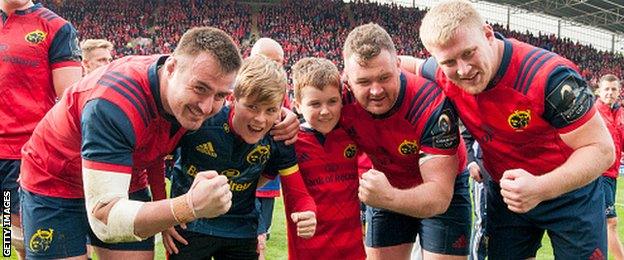
Anthony Foley's sons, Tony and Dan, joined the Munster players on the pitch at full-time
Vintage Munster
This was Munster rugby played in the style and ferocity of their greatest teams from the past decade; unrelenting ferocity, clinical finishing, passion personified. It could have been Foley out there making the hard yards instead of CJ Stander. It could have been David Wallace at seven inside of Tommy O'Donnell.
In the mind's eye, O'Mahony was as much of a dervish and monumental pain in the opposition's backside at blindside as Alan Quinlan and Denis Leamy were in their pomp.
For Paul O'Connell and Donncha O'Callaghan, read Donnacha Ryan and Billy Holland. For Marcus Horan, Jerry Flannery and John Hayes, read Dave Kilcoyne, Niall Scannell and John Ryan.
You can pay these guys no greater compliment. They fronted up. As individuals, and as a team, they're not in the same class as Munster's Heineken Cup-winning sides of 2006 and 2008 - but on this particular day they were.
Maybe it was a one-off, hewn from the despond of the week, but they were outrageously good.
Two tries in 14 minutes, then a red card for Keith Earls and then - without missing a beat - another try. Unyielding and unstoppable.
There were so many moments that stood out and some of the finest ones were old school Munster. The monster 26th-minute scrum that brought a penalty, a Thomond Park roar that shook the ground and then three points that stretched the lead to 17-3.
Another moment and another scrum. Or scrums. At the beginning of the second half the worries still hung in the air about Munster's capacity to maintain the power without hitting an emotional wall. Again the questions were answered.
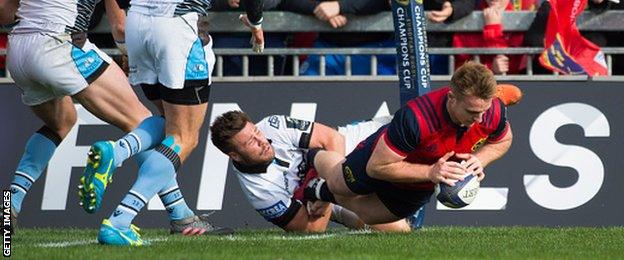
Rory Scannell dives over for Munster's fifth try
'Stand Up And Fight'
In the early minutes of the new half, Munster blitzed the Glasgow scrum once, twice, three times. Penalty try. Bonus point. Euphoria in the stadium. A powerful reminder of blissful old times, when they were kings.
Glasgow changed their team. They substituted their props but the pain didn't lessen. They brought new blood into their pack, but the demolition continued. They tried to fight Munster fire with fire of their own, but what's to be done when you're packing a lighter and the others a flame-thrower.
Gregor Townsend said that his team never turned up. You could see his point. Again, it was a throwback to when fancied teams came here - to the old Thomond Park as opposed to the new - and were sent away as beaten and slightly haunted men. Glasgow had that look about them on Saturday evening.
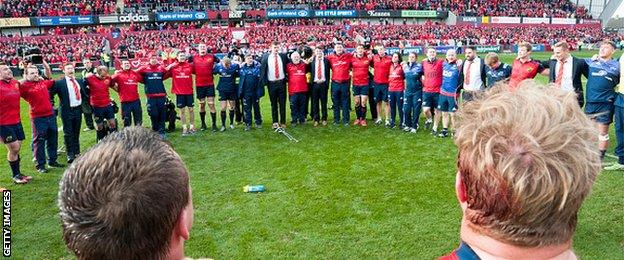
Munster players and fans joined to sing the team's anthem 'Stand Up and Fight' after defeating Glasgow
Townsend said something else. He spoke about the red card for Earls and Glasgow's inability to capitalise on it. He said that in ways, yes, his team were playing against 14 for over an hour, but in other ways they were playing against 26,014.
The Glasgow coach got that one right, too. It didn't lessen his frustration and anger at the way his team was bullied out there, but it was true none the less.
A powerful day had the perfect ending for Munster: a win and a song. Normally these players find the sanctuary of their own dressing room before they belt out their anthem, 'Stand Up And Fight', after a match - but this time they made it public and it was moving.
Foley's two young sons, Tony and Dan, joined the players in a huddle on the pitch and of all the remarkable things that have been seen here down the years - the great performances and seismic European wins - that simple moment when a family, a team and a support were united together was one to top them all.
Poignancy and points on a bittersweet day.
- Published22 October 2016
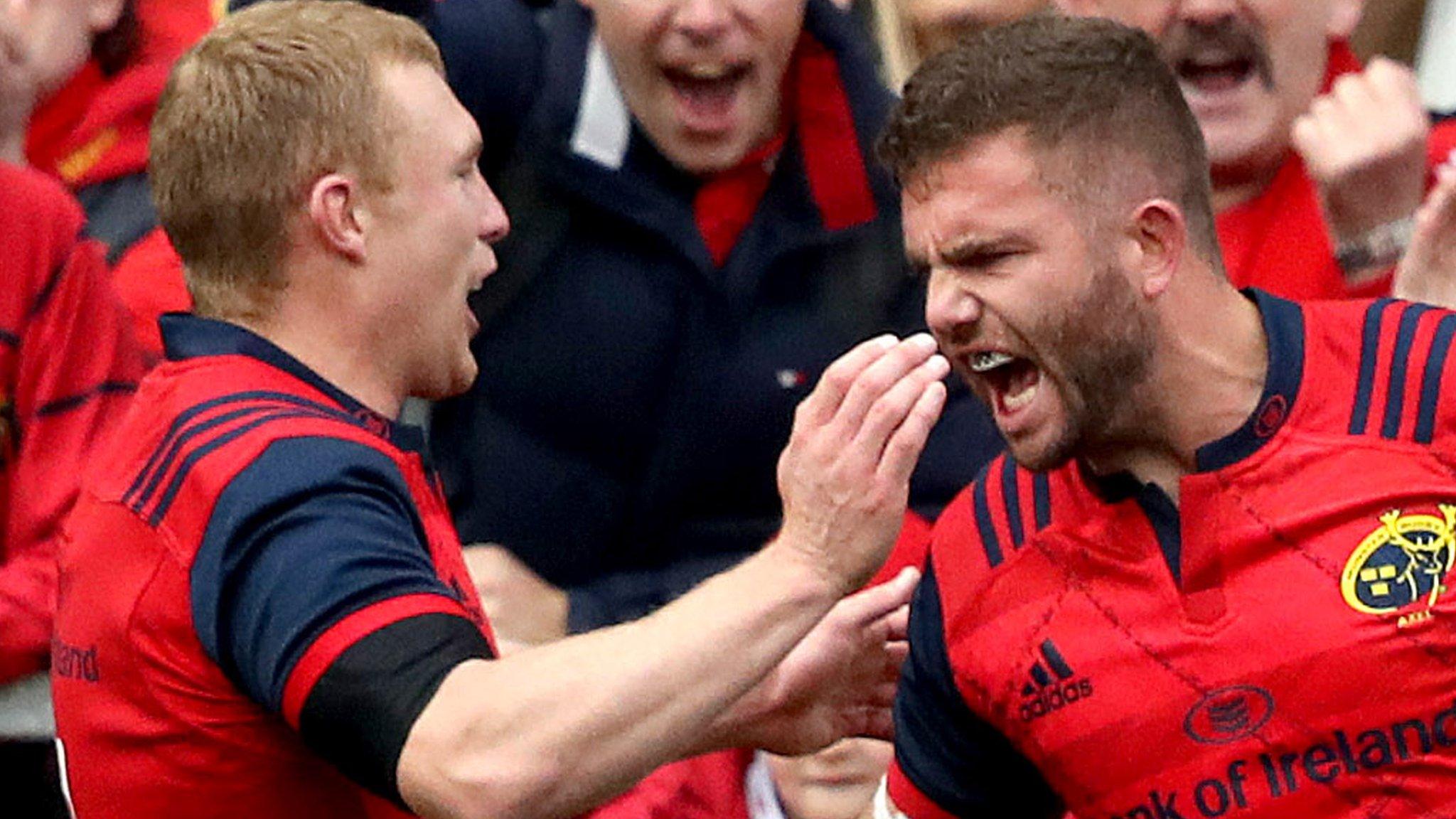
- Published19 October 2016
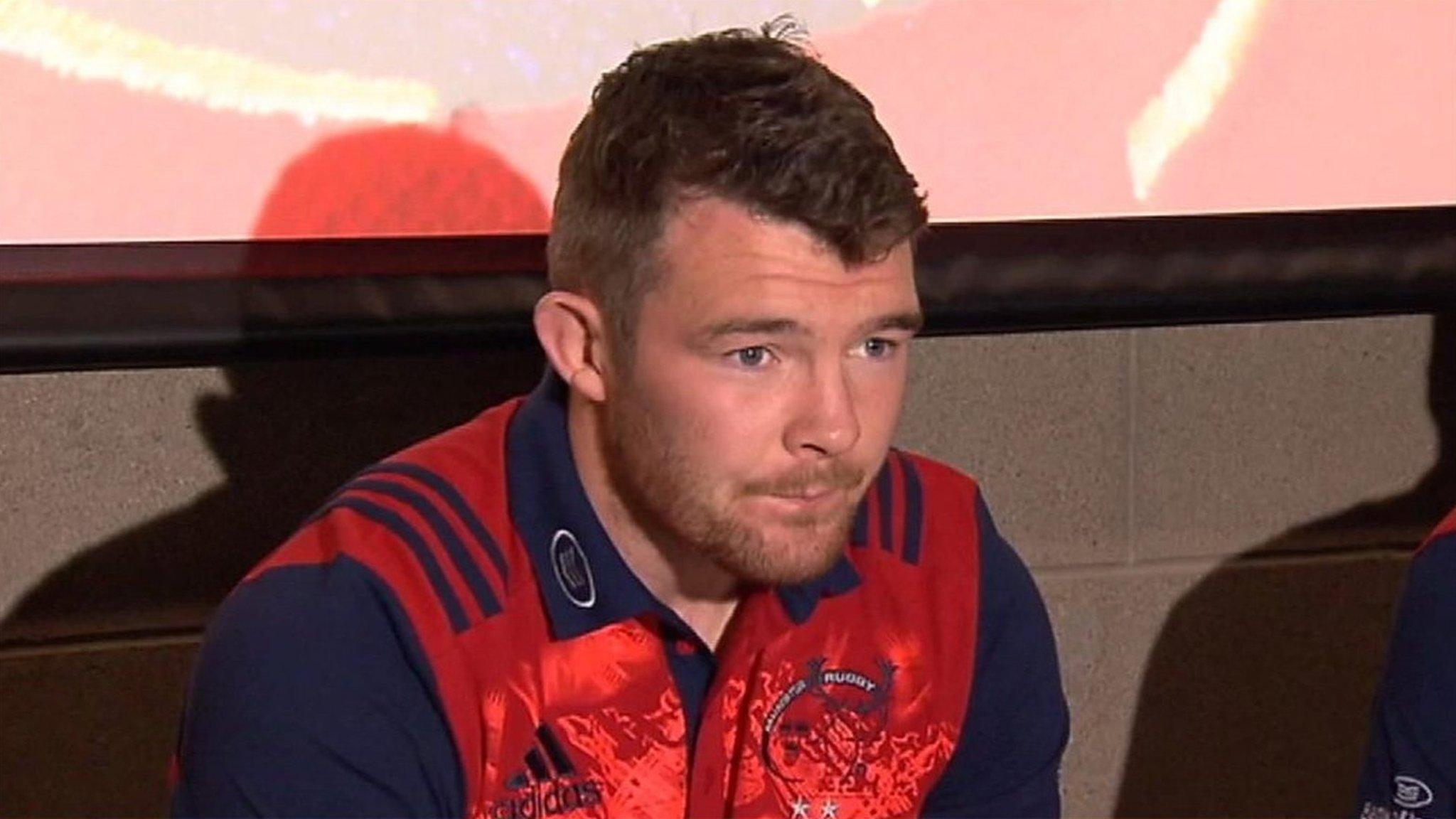
- Published20 October 2016